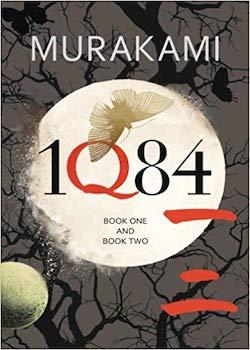1Q84

By Haruki Murakami
Vintage (paperback)
2012, 464 pages
ISBN-13: 978-0099549055
Review by Chris Corker
Haruki Murakami’s most recent novel 1Q84, the title being a nod to Orwell’s 1984 (the Japanese 9 being read kyuu), was released in two stages. Books 1 and 2 coming out a week before book 3. While on one hand this may have seemed like a marketing ploy, it did make an otherwise daunting novel manageable (1Q84 is comparable with The Brothers Karamazov in terms of size). While I don’t agree that 1Q84 is quite the Magnum Opus that others have claimed (I feel that Wind-up Bird Chronicle may yet retain that title), it is as infinitely readable as so many of Murakami’s other works .
On her way to kill a man in a Shibuya hotel, Aomame is forced to take a shortcut from the bridge, climbing down a ladder. After the man is dead, Aomame begins to notice subtle differences around her, indicative of what she decides must be a parallel universe. At the same time, Tengo receives a rough but promising manuscript from a young girl who he later discovers is dyslexic. When he visits the girl to ask for permission to re-write the manuscript, he finds that her family are part of a religious commune, which the girl herself escaped from. The rumours are that everyone there is being brainwashed and conditioned into emotionless robots. This is the intriguing setup to a story that combines elements of detective stories, horror and the supernatural, as the two main characters become entwined in matters above their heads.
The story is nicely set up and starts to flow well. I have to say that I’ve never been a fan of the alternating perspective of storytelling, a technique that other authors stretch to the limits of usefulness, as it feels like a padding technique. It does, however, in this case give us an interesting pace shift and allows us to share the frustrations of the characters as they search for each other in vain.
Tengo is, in a lot of ways, the archetypal Murakami protagonist. A 30 year-old misanthrope, detached from the workings of society, without a real job, without a real relationship, not really knowing the destination he wants to take in his life. What’s different about Tengo, however, is that he seems so much more selfish than the usual type of protagonist employed, making him harder to relate to as a result.
The other main protagonist, Aomame, is a real conundrum. Her motivations for doing what she does seem a little weak (the lady she works for never goes to such extremes herself) and even at the end of the novel, I found it difficult to muster any sympathy for her. She also seems overly fascinated with her own body (perhaps a slightly masculine interpretation of a female protagonist – I am yet to be convinced by Murakami’s female characters).
In terms of the storyline, I can divulge very little without spoiling the plot. One of the more atmospheric recurring scenes features a spectre-like NHK (the Japanese BBC) collections officer who slams on the doors of apartments in a brilliant metaphor for a guilty conscience. I also found the New Religion plot to be very intriguing, with a fulfilling conclusion, which is more than can be said of the novel as a whole, which ends vaguely.
The subject of New Religions is one that is far from a dead in Japan and, even now, new religious organisations similar to Aum Shinrikyo (a subject that has also been delved into in Murakami’s book Underground: The Tokyo Gas Attack and the Japanese Psyche, which documents first hand reports of the Sarin Gas attacks) are still going strong, with member contributions funding their operations. The claims of these organisations, much like the nature of the Magic Realism that Murakami employs, are difficult to believe and understand, but easy to accept and often ensnare the unsuspecting. This also is the strength of Murakami. It isn’t always clear why he does something, and often there seems to be no reason at all, but his books are addictive nonetheless. I took less away from 1Q84 than I did his other works, but it still had me eagerly turning the page.
Would I recommend it as an entry point for non-Murakami officianados? No, I wouldn’t, but it is still a pleasant read where Murakami veterans will find elements of the things that made Murakami such a beloved author, and this work also gives us hope for his next novel, the long-windedly titled Colourless Tsukuru Tazaki and the Year of His Pilgrimage, which was released in Japan only recently. This is a shorter work which was adapted from a short story, much in the way Norwegian Wood was adapted from Firefly, and may be a more accessible book for newcomers to the Murakami canon.
I’ve been a Murakami fan since my first year at university. At the time I was trawling through book after book of clearly defined Thriller, Crime and Horror, shamelessly adhering to archaic conventions set down decades ago. Finally, I came to a book with pure white cover featuring a picture of a black kitten. The name, Kafka on the Shore, was bizarre enough to interest me and I flipped over the book to read the synopsis. It was totally different to any premise I had read before, seeming part screwball comedy, part magic realism. I read it in a couple of days. Having become more familiar with Japanese culture, his books seem slightly diminished in their novelty, but his gift of storytelling and intrigue still had me eagerly awaiting each new work like 1Q84.

